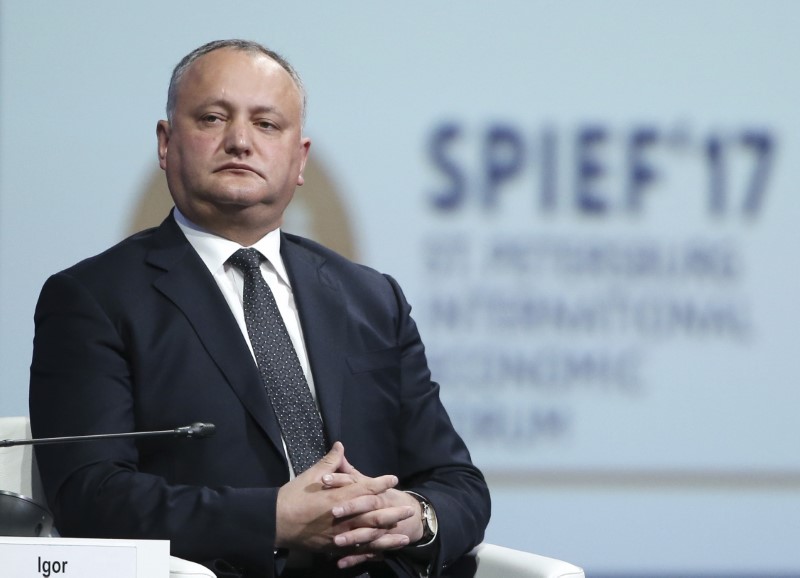By Alexander Tanas
CHISINAU (Reuters) - Moldova's Moscow-backed President Igor Dodon said on Friday he hoped the ex-Soviet nation would be granted observer status to a Russia-led customs union before the end of 2017, despite a government push for closer integration with the European Union.
Since his inauguration in 2016, Dodon has been at loggerheads with the pro-Western government over his desire for Moldova to abandon a trade agreement with the European Union and move further into Russia's orbit.
Dodon told Reuters in an interview it was unlikely Moldova could join the Eurasian Economic Union (EEU), a trade bloc that includes Russia, Armenia, Belarus, Kazakhstan and Kyrgyzstan, in the next three to four years.
"The roadmap to join the EEU is very complicated," he said. "I hope that by the end of 2017 we will get observer status."
This week, the deep divide between pro- and anti-Russian factions in Moldova is in particular focus due to the 25th anniversary of Russia's deployment of troops in Moldova's breakaway region of Transdniestria.
"In Moldova it has always been this way. And unfortunately it won't be possible to get over this (the differences) in the immediate years ahead," Dodon said.
After the interview, Moldovan authorities stopped a plane from landing in Chisinau airport that was transporting Russian Deputy Prime Minister Dmitry Rogozin to anniversary celebrations in Transdniestria.
Dodon, who plans to attend the ceremony on Saturday in defiance of the Moldovan government's opposition to the event, said the authorities' actions would affect Moldova's future relations with Moscow.
"We will have partner-like, friendly and strategic relations with Russia, but this bitter after-taste will remain of course," he said.
REFERENDUM BLOCKED
Dodon has sought to increase his presidential powers since a $1 billion corruption scandal that sapped the popularity of pro-EU leaders helped propel him to electoral victory last November.
However, he suffered a setback on Thursday when a court rejected his plan to hold a referendum in September that might have granted him the authority to dissolve parliament and call a snap election.
Dodon sees the ruling as evidence of governmental pressure.
"I think they will block any decision and attempt by the president to carry out reforms, but the people see this, the people understand," he said.
"Ahead is a year of difficult struggle between on the one hand the president, and on the other hand the parliament and the government."
Dodon wants parliamentary elections in 2018 that he believes would be won by the opposition, pro-Russian Socialist party, which he led before becoming president.
Moldova has been governed by pro-Western leaders since 2009 and inked the EU Association Agreement with the EU in 2014.

Russia retaliated by halting imports of Moldovan farm produce, depriving Europe's poorest country of a key market for its wine, fruit and vegetables.